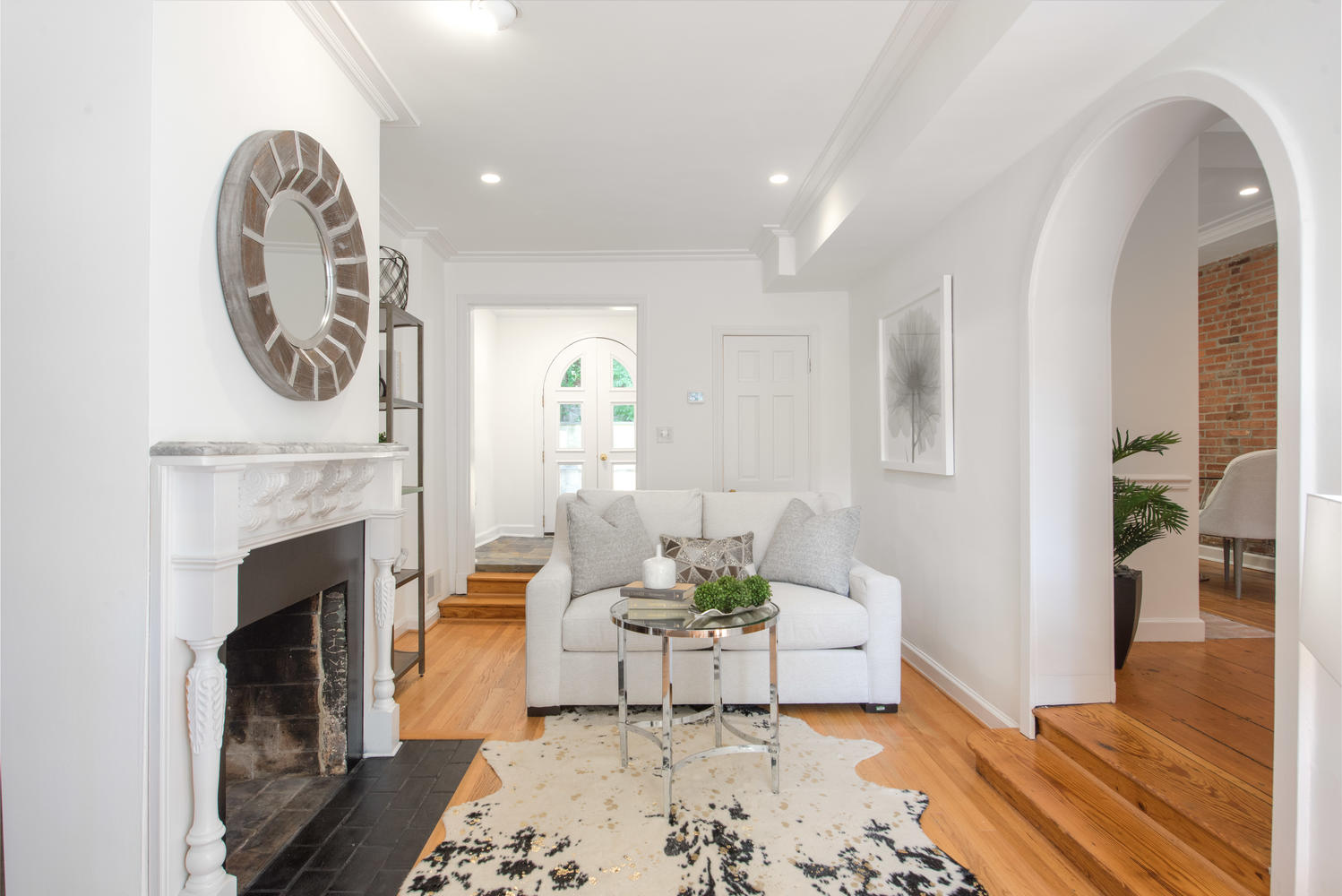Steps To A DC Home Purchase
Ready to purchase your first personal residence in Washington DC but don’t know where to start? Here’s our ‘best practices’ list to set you on the path to home ownership.

1. Mortgage Loan Pre-Approval
Why do it first?
- You’ll know your buying power and the cost of borrowing
- It will show prospective agents you’re serious about your search
- You’ll use your Pre-Approval to estimate transaction costs
- You’ll provide your Pre-Approval to prospective agents
- If you find the right property quickly, you’ll have what you need to write an offer
We recommend that DC home buyers contact three lenders for mortgage pre-approvals and worksheets. Request pre-approvals for the home type(s) you plan to purchase, at the mid-range and very top of your price point. This will allow you a working estimate for your desired price point, and a ‘worst case scenario.’ Better to be well-informed than panicked at the last minute!
You’ll want a pre-approvals from a local, reputable lenders. You can get a pre-approval over the phone & online.
Review DC homebuyer programs for those that may benefit you. You may also qualify for down payment assistance, home buyer tax credits or DC tax abatement.
Don’t make a lender commitment until you’ve contracted on a home. DC condos, new construction, co-ops, and single family properties all qualify differently. Your priice point also makes a difference. Lenders offer a variety of programs. You’ll want to match your loan to the property you want to purchase.
2. Partner WIth A Realtor
Interview Realtors to find the professional best suited to your needs. Here are some questions you might ask
- Please summarize DC real estate market conditions right now
- Please explain the value of a buyer’s agent in this market
- What are the risks of not working with a buyer’s agent?
- Please explain upcoming or instituted commission payment changes resulting from class-action lawsuits and DOJ actions
- Please explain buyer agency
- Does your brokerage charge an ‘admin’ fee? What’s it for? How much is it? Is it negotiable?
- What are your commission rates? Are they negotiable?
- How do you manage listings where cooperative compensation is not provided?
- What’s your strategy for negotiating commissions with a seller and listing agent?
- What are the steps to a home purchase?
- What tools do you use for the home search process?
- What’s the typical length of a home search and contract cycle?
- How will I know if my home search is realistic and achievable?
- Will I be able to view off-market listings?
- Do you handle my transaction personally, or will I be working with someone else?
- What’s your communication style and what communication tools do you use?
- How many years have you practiced real estate in Washington DC?
- What experience do you have assisting buyers in my pricepoint, desired neighborhood(s) and home type?
- Please explain how appraisals can affect my transaction
- What do I need to know about home inspection contingencies in the current market?
- What expectations would you like to set with me?
Here are some questions you may be asked
- Do you have a pre-approval letter issued within the past 30 days? Who’s your lender? You’ll be asked to provide a copy of the pre-approval
- Do you have any credit, tax or other issues that may affect your ability to obtain a mortgage loan? What type of financing will you use, or are you paying cash?
- Do you have available funds for an Earnest Money Deposit?
- Do you have available funds to cover broker commission, should it be necessary?
- Do you have closing costs worked into your budget, and available funds for closing costs?
- What will be your downpayment amount?
- What are your expectations for your home search?
- What would be a realistic outcome for you?
- Do you have any concerns about working with a buyer’s agent?
- Do you understand what buyer’s agents do and how they benefit your search?
- Desired locations, “must-haves” & “wish list?”
- Pets? Parking? Metro proximity?
- What’s your timeline?
- What else is important to you?
Bullet Points
- Get a pre-approval first
- Partner with an experienced agent
- Prioritize needs + wants before touring
Michael V
I went to The Isaacs Team after working with another realtor that wasn’t really delivering the level of detail on potential homes that I was seeking. Susan and Alex not only met, but exceeded my expectations in the level of knowledge I sought. Their level of professionalism has secured them a client in me, for all future property purchases.
3. Draft A Game Plan Once You Hire A Realtor
Discuss your needs/wants list and price point with your agent. Is it in line with market conditions?
Be transparent. Your agent is your transaction partner, not an adversary. Provide us with as much information on your financial limits, preferred locations, and needs vs wants as possible. Include preferences on proximity to transportation, area amenities and other essentials, from number of bedrooms and baths to square footage, parking needs, stairs vs elevators, basement or terrace level preferences, area preferences, proximity to metro or other modes of transport, laundry facilities, pet restrictions and more. Communicate your timeline clearly because it will help determine how your property search progresses. The better you define and prioritize all your criteria, the more efficient we can be in identifying matches and helping you meet your goals in an efficient manner.
Narrow down neighborhoods, a price range and must-haves for your search. At this point, we create one to three Collections to start screening properties. We’ll discuss merits of each listing, create a short list and set up your first tour.
4. Search And Identify A Property Of Interest
You’ve found ‘the one!’ Now it’s time to work out the details.
We’ll tour the homes of interest to you. When you find a home you like, the next step is to research its value and outline an offer strategy. We’ll create a Comparable Market Analysis, discuss commission options, and assist you in arriving at an effective offer price and terms. The strategy for offers differs with each property.
5. Contract Ratification & Contingencies
We’ll draft your offer and send it to you with all the necessary disclosures for signature. Once we receive the signed offer back, we ‘package’ it for the listing agent to easily understand and present to the seller.
Once youhave a ratified offer, the contract phase begins. During this time, you’ll exercise your contingencies, if any, perform your due diligence and review any additional documentation required or provided. There may be some additional negotiation involved, for contingencies such as inspection and appraisal. Once all contingencies are satisfied, you’re on your way to settlement.
6. Settlement And Post-Closing
At settlement, you’ll take legal possession of your new home. Your title company will facilitate the closing, during which you’ll sign loan documents, if any, and other settlement paperwork. At the end, you’ll be handed the keys to your new home.
Post-settlement, we’ll be checking in to make sure your move went smoothly and all is as expected with your home. Many clients appreciate having access to our contractor and vendors list for improvements and repairs.
We’ll continue to stay in touch, and we’re always a text or email away if you need anything!
TIP
Earnest Money
Earnest Money Deposits typically range from 3% to 20%, depending on the situation and price point. The lower end of 3% commonly represents an amount equal to a special mortgage program, or relates to a low-priced property. EMD at the higher end commonly relates to sums for cash transactions, high-value purchases and/or deposits relating to multiple offer scenarios. EMD is presented with your offer in the form of a photo of a check, and credited toward your downpayment if the contract goes to settlement.
Note:
- EMD will be lost if you default on your contract.
- EMD is held by the title company and deposited when a contract is ratified
- EMD percentage affects the strength of your offer.
TIP
Down-Payments
Note:
- Downpayment amount can affect the strength of your offer
- If in doubt of your down payment %, err on the conservative side. You can always increase downpayment, but reducing can trigger contract issues
- Consult with a mortgage professional to determine your downpayment options. Always consult with a mortgage professional to determine your downpayment options.
TIP
Closing-Costs
Note:
- Three pre-approvals from different lenders are recommended for best comparison
- Be sure to use the same criteria for each pre-approval for best results in estimating closing costs.
- Worksheets should be as close as possible to a Closing Disclosure.

